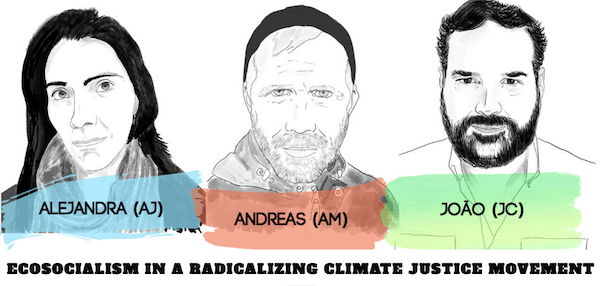Fight the Fire Podcast and Transcript –João Camargo (JC) | Alejandra Jiménez (AJ) | Andreas Malm (AM)\
In this debate we had an introductory conversation about ecosocialism, the climate justice movement, what role they can play together and what programs and alliances they can create for this historical moment.
JC: This is going to be our first debate in the Fight the Fire Ecosocialist magazine. The idea of the Ecosocialist magazine is to bring ecosocialist perspectives into the climate justice movement. This is important because some of the existing flaws in the movement, in its projects, in its program, often also relate to ambiguity in terms of political aims, in terms of tactics, and the possibility of having non hegemonical political perspective taking root in this movement.
We are in the board of the magazine. My name is João Camargo, I’m a researcher at the University of Lisbon and I’m an activist in the climate justice movement in Portugal, in Climáximo. Alejandra Jiménez is an activist in the antifracking coalition in Mexico. Andreas Malm is an associate professor of human ecology at the University of Lund, in Sweden.
I’m going to just kick it off: how do you think that the climate justice movement could benefit from an ecosocialist component that is highly effective?
AJ: I think that in this context of climate emergency and of extractivisms, it is very important to have a perspective from ecosocialism, thinking precisely that inequality has increased, colonialism has increased and the situation isn’t only about environmental problems that are aggravating. There’s an increase in social inequality and other structural problems that were never solved, in particular the control from the Global North, extractivism, colonialism, racism, patriarchy. These issues seem to be disarticulated from the environmental discussion, from the discussions that are happening in the context of the climate emergency.
So, I think it is very important that we are discussing these issues, that we don’t leave the discussion on these terms. There are guilty people, these people are in the Global North, and at the expense of their privilege, the South is suffering most of the problems of the climate emergency. So it is important that we keep looking at these from the viewpoint of justice, also from the viewpoint of what is happening in the South, the movements that are acting in the South. The struggle for the climate had a recent strong impetus in Europe, in the Global North. But for centuries, first peoples have done a very important work to protect the ecosystems and its exactly in this possibility of recuperating the technologies, the knowledge from the first peoples that we may find many responses.
“it is very important to have a perspective from ecosocialism, thinking precisely that inequality has increased, colonialism has increased and the situation isn’t only about environmental problems that are aggravating.”
Alejandra Jimenez
AM: So, from my horizon, I would say that clearly the climate movement is undergoing a process of radicalization in at least two different respects. And I’m thinking about the Global North. One is tactical. So you see an escalation, most recently with Just Stop Oil, today stepping up from blockades to actually destroying gas stations or sabotaging equipment at gas stations. So this is in line with the general trend towards more confrontational tactics.
The other trend, I would say, is an ideological radicalization that you see both with XR (Extinction Rebellion) and its various offshoots and with Fridays for the Future, the two linchpins of the mobilizations that happened in 2019. With Fridays for the Future, the rhetoric is taking on more anticapitalist vibes or sound bites or buzzwords. The most recent strike was launched under the hashtag #PlanetNonprofit, I believe, or something of that kind.
The role here for an explicitly ecosocialist current, however it’s organized would, to me, to my mind, particularly be in the ideological sphere. So, of course you could envision ecosocialists being a kind of vanguard for tactical escalation. But I would say that the main role might be in formulating and pulling out the implicit logic of an anticapitalist position in the climate movement and making it more coherent, fully fledged as a program, as an idea about how to confront dominant capitalist class interests. So, an ideological pole of attraction for the radical part of the climate movement, that would presumably play a big role as the movement undergoes further radicalization.
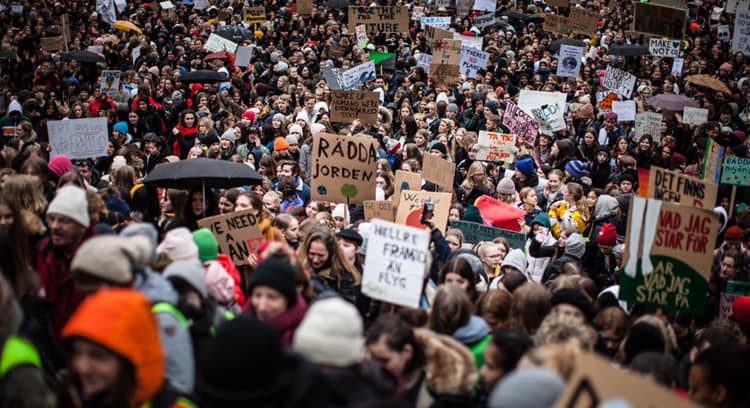
“I would say that the main role might be in formulating and pulling out the implicit logic of an anticapitalist position in the climate movement and making it more coherent, fully fledged as a program, as an idea about how to confront dominant capitalist class interests”
Andreas Malm
JC: I think, in very practical terms, what is required to have the necessary cuts in emissions means a massive destruction of capital, capital which is today counted by governments and the biggest companies in history as something which is already theirs. The movement needs to act to destroy this capital. So, this 50% cut, or something around about that, in this decade, means effectively the biggest revolution in history. So to think about it as something that does not need to shake society to its very core is very naive.
I’m not saying that ecosocialism already provides all the answers for this. I don’t think it does. It gives out some interesting perspectives that need to be developed. And I think they need to be developed within and reflecting the radicalization of the movement.
Capitalism now is not a defect, it is structure, it is doing exactly what it is built for. It is working perfectly in its own terms. There is this minor issue of the existence of people, species, communities, everything, but there’s no mistake here.
Obviously a massive part of society and a big part of the movement still think that this is a mishap, an accident, and not what capitalism was actually built for. I think this is shifting quickly and what ecosocialism can bring is a revolutionary theory. One of the big issues not only with the climate justice movement, but with movement for the last 30 years is lack of a theory of what a revolution is. We are still based on revolutionary theories that are one hundred years old, about what tactics work, strikes and protests work.
The current theories are very much influenced by the current forms of power. That power points us towards a means of actually never achieving any effective revolution. Changing this is a major task if we plan to bring in an ecosocialist perspective. And it is something that needs to be built in practice with movements actually doing things all around the world.
“what ecosocialism can bring is a revolutionary theory, it needs to bring a revolutionary theory. One of the big issues not only with the climate justice movement, but with movement for the last 30 years is lack of a theory of what a revolution is”
João Camargo
Obviously, one of the issues that Alejandra raised is very important, the issue of reparation, and also the issue of acknowledgement, because resistance to this type of “development” is a constant in history, and specially by the people most affected by it. In the Global South, obviously, and also in the Global North. Capitalist development was always a conscious choice, everyone was very much aware of what was happening and of the effects, and they are still aware of that. So solving this can never happen through a mediation process with those who are actually doing the destruction.
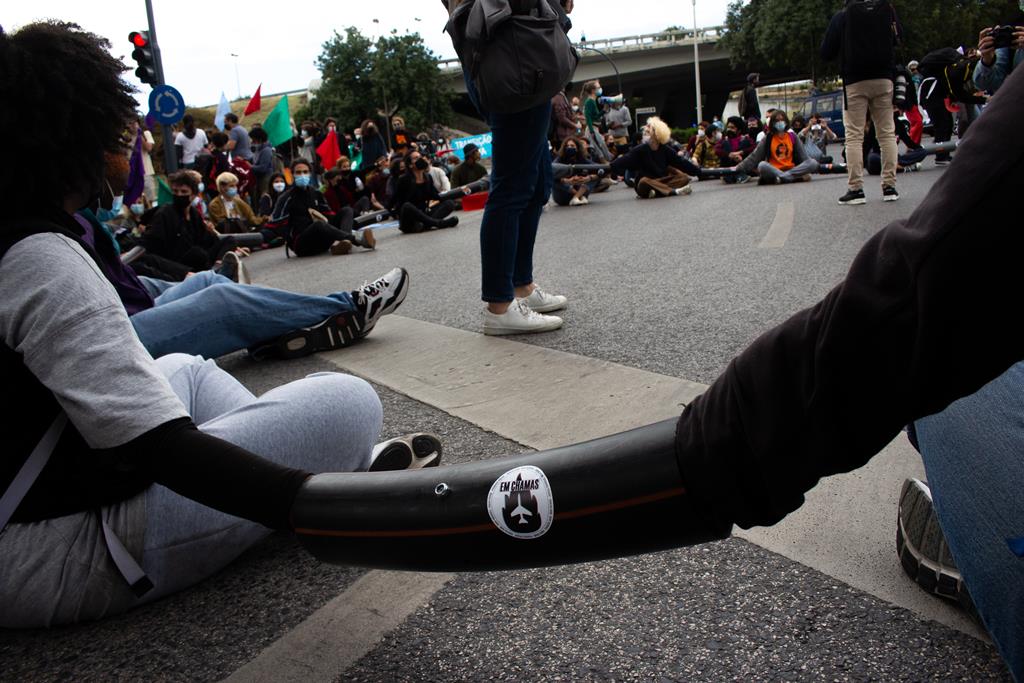
One of the things that presents us with a problem is what is the connection of such a theory of ecosocialism with the current existing state system. States are a fact. They exist everywhere. But I’d like to raise the issue of nationalization, because in a few contexts, the issue of nationalization is presented as a solution. In some contexts I believe it might be a solution, but it is not an unequivocal solution or a one-size-fits-all.
In particular, I would say, Portugal had a revolution in 1974. That revolution nationalized the banking system, the energy sector, fuels, everything, but this also shifted in the last 50 years.
But in Mexico, per example, the biggest oil company, which is also one of the biggest oil companies in the world, PEMEX, is a public company, owned by the State. So I would like to kick off the second round with this issue of power. Can the current power, the current institutions be the platform used by the movement or by a part of the movement to usher in this revolution?
AJ: In Mexico, nationalization was a driver for development, but for development in western terms. So this development meant the destruction and extermination of many people and the erasing of many traditions, of the identity of many communities. So, doing a balance, I would say that it wasn’t a good thing for Mexico, which is a diverse country, culturally diverse, ecologically diverse. The impact of nationalism and the narrative about development also impacted ecologic diversity.
I think this formula of capitalism with the State and patriarchy is exactly one of the basic requisites for us to face this struggle, the climate emergency. Capitalism is always together with the State, so we need to leave the narrative of the State, we need to leave this logic of demanding from the State that it responds in face of this catastrophe, and we need to articulate from the ground up. We can’t wait for states to come save us because we know, and in this moment with even greater clarity, that states work in alliance and serve the great capitalists and the great corporations.
It is indispensible for us to identify very clearly that to maintain the climate struggle, the climate movements, we can’t do it through the state, because it works hand in hand with capital. And I say this from a feminist perspective–it’s important to identify that state and capital are also hand in hand with the patriarchy. They are crunched together.
It is indispensable that we identify that to struggle for the climate that there’s a part of this triad that is the patriarchy. There are differentiated impacts on women, beyond just living these differentiated impacts, as women are the first lines of battle. It is important to recognize this.
So, I come back to where we can find answers and I think that women have been able to preserve some of the answers that existed since before capitalism, when land use, the relationship with nature was much closer and that this was lost with capitalism. Women hold a lot of baggage of important knowledges that were preserved. For me, these are aspects that tell us that it is not with the state that we will find the answers, that we need to go beyond the logic of the state, of the narrative of the state, and of the nation, of nations.
I would like to resume what I wanted to say about Pemex and Mexico. Here we can see that with this new government, that presents itself as left wing, that has shown us that it follows the same logic of capital. It is implementing projects that paint themselves as “projects in service to the people”, but that are only projects that will benefit great capitalists. They present these under a logic of “energy sovereignty”, of nationalism, but they only benefit great capitalists.
So here there’s a risk of capitalism ‘eating’ social movements, struggles, even the Left itself. It is very important for us to know this, to understand this: how did capitalism eat the Left’s discourse? I think It has a lot to do with the ability that capitalism had of changing, of adaptating well. We should be very critical about how the Left, how socialism wasn’t able to adapt to this. We need to know very well how capitalism has this capability of adaptation, of eating everything in its path, mimicking all the social movements it finds.
In Mexico, this happened with the new government that calls itself left wing, that presents itself as being on the side of the people. We see that those suffering the most with the decisions of the government are the people themselves, the first peoples, over whom “development” projects are being undertaken today, despite being contrary to their will, to their life plans. They are going over their heads, without consulting them, disregarding their demands that these projects not be implemented, all of this under threats, that also extend to activists and the defenders of the territories.
We can’t wait for states to come save us because we know, and in this moment with even greater clarity, that states work in alliance and serve the great capitalists and the great corporations.
Alejandra Jiménez
So, to me we have to be careful with how these new capitalisms mimic, how they devour the Left in discourse and in action, and also in our strategies of action, that are frequently mimicked, adapted by capitalism itself for its own interests. And here ecologism and ecosocialism are also at risk, as we are coexisting with them and are at risk of being absorbed by capital. I think a key issue is the monetary system, because at the end of the day, we are all under the logic of money and its a logic that heavily dominates and that is cherished as something almost sacred. We need to strongly attack this.

AM: Yeah, so as I see it, a demand for socialization, or nationalization, or expropriation, or whatever we’re word you want to use is not a demand that puts any kind of trust in the existing state to do things for us. I mean, when, the revolutionary workers movement in Europe demanded nationalization or socialization 100 years ago, that was an obvious conflict with existing states.
Today, there is no state, if you look at Europe, or for that matter, Canada, or Australia, or the U.S., any of the advanced capitalist countries, that would of its own accord move to take over private energy companies, oil, gas and coal companies. So it’s a demand that runs against the thrust of government policy in all of these countries.
Now, I will repeat what I said at the debate in Glasgow here: I don’t see nationalization, obviously, as a panacea as a magic bullet as something that will by definition, solve this problem, obviously, because we have so many state owned oil and gas and coal companies around the world that are just as destructive as any other. But what is an absolute prerequisite for progress is that you establish public control over energy systems. Of course, you can imagine remote controlling private companies, by some other means, then taking them over outright and making them public property. But in an extreme emergency, such as the one that we’re in, it’s seems to me that taking these companies over and putting them under some sort of public democratic control is the most sensible thing to do when you’re dealing with massive corporate entities that need to be totally transformed, as in TOTAL, or Shell or BP, these mega corporations that totally rest on fossil fuel production.
They have to cease to exist as such. It is hard to see that happening in any other way then states taking them over, sequestering them and transforming them into something completely different. If these companies are already in state ownership, such as in Mexico, or in Brazil, or Norway, and other places around the world, then you already have the institutions of property in place for the government to just decide that these companies need to do something completely different.
Just my own country, Sweden, it has a very nasty oil company. It’s very far from one of the biggest in the world, but it’s very nasty. It’s called Lundeen energy. It’s one of the biggest players in the Norwegian oil industry. And of course, Norway is Europe’s largest oil and gas producer, and this company has no right to exist, I think. There is a little bit of an attempt to raise the demand to nationalize and completely overhaul this company, you know, bury it as an as an oil and gas company. Insofar as it’s going to exist as a corporate entity, it’s going to have to be under public control and do something completely different.
But phrasing it in terms of socialize these companies, obviously works in the places where this industry is privately owned still. The whole industry is private in the U.S., which is the world’s largest oil and gas producer. The coal industry is entirely private in Australia, which is the world’s largest coal exporter. The coal industry is private in Germany, which is the world’s largest producer of lignite coal, the dirtiest coal of all, and so on, and so forth. So these are major components of the global fossil fuel industry that are privately run, and we can’t have private property in fossil fuels. That has to come to an end.
JC: Okay, I’m gonna just add a little chip into this debate because obviously, the tools for nationalization, not socialization, but for nationalization, for state control, have been put into effect with COVID, previously to that with the financial crisis in 2008 and 2010. And I think there’s going to be a tension rising from the radicalization of the movement to nationalize, and bailout or to further protect these companies. I think this is an important risk. Because when we say we need to nationalize them, for that to exist, we would need to have a government that wants to nationalize them to bury them, which is also something that is not in an obvious issue on the horizon, nothing that we can see immediately at the moment.
We can’t say: if this party will take over, they could do this. I don’t think that any party in the Left, would, at this moment, even go to elections on such a platform. So my issue is: these institutions to which all parties that exist in their current form, which is the same for basically all of them, they’re trying to run institutions that were built and are structurally designed to preserve capitalism, to preserve stability. And I think we need to imagine how power can be taken out of that.
Obviously, if we look 100 years ago, there were other institutions created right next to it: assemblies, workers councils, soviets, which had the objective of delegitimizing that. I think one of the issues that came when XR had their demands, one of them was assemblies. They were random, which don’t quite understand how that would solve the problem.
But I’d like to kick in a bit of about this. Do you think that the only model of alternative power would be something on those lines? Or do you think we can imagine something different in this case, concerning also the time that we have, and that maybe some institutions can be coerced to work towards such an effect, probably in non central capitalist countries? But in others, I think this would be highly problematic or altogether impossible.
“when we say we need to nationalize them, we would need to have a government that wants to nationalize them to bury them, which is something that is not an obvious issue on the horizon, or something that we can see immediately”
João Camargo
Current institutions basically exist to preserve capitalism. So we need to think about power, not only through these institutions, but also looking back into the past or maybe something new that you have in mind. Do you have the silver bullet? Hidden in your living rooms?
AM: Yeah, well, I don’t have any silver bullets in my living rooms. I mean, you started off by saying that the ideas we have for a revolution or maybe not so well suited to the present moment because they are a century old. And a century ago, the idea of dual power was very much alive because it was entirely conceivable that you would see working class organs of power emerge alongside or outside and in opposition to the existing state, and that they sort of contained the seed of another kind of power order.
That’s very hard to see today. It shouldn’t be completely ruled out, because miracles can happen in history. But it is very far from what’s on the agenda of politics today, compared to what it was a century ago, because of so many changes that have happened on every dimension of society.
On the other hand, the political situation is extremely volatile. We know most of the things that are happening in the world are one shitstorm or another, it’s a pandemic, or it’s a war or it’s climate crisis or something like that. We’ve seen over the past, I don’t know, decade maybe, or since the economic crash in 2008, particularly since the events of 2011, we’ve seen proto-revolutionary crises, or various types of outbreaks of rebellion around the world and social unrest.
We don’t know how they will appear in the coming years, but it’s quite likely that we’ll see more of this unrest and in a world that is so rife with conflict and injustice and antagonism as this one is. Of course, you can fantasize about various kinds of dual power-like structures emerging in contexts like these. Everything from the uprising in Chile and the new left-wing government there, to some of the experiences in the MENA region, Middle East, North Africa. I mean, there are, of course, revolutionary experiences to draw on from the past decade, although they so far have had very little immediate overlap with or integration with any kind of climate movement. What I’m trying to say is that we shouldn’t give up entirely on the idea of forming alternative power centers outside of the existing state apparatus that can challenge existing state institutions, but that also might have to sort of project their power through existing power institutions rather than just supplanting them completely, which in way was the case with original dual power as well. Even in the Bolshevik Revolution.
you’re dealing with massive corporate entities that need to be totally transformed, as in TOTAL, or Shell or BP, these mega corporations that totally rest on fossil fuel production. They have to cease to exist as such. It is hard to see that happening in any other way then states taking them over, sequestering them and transforming them into something completely different.
Andreas Malm
AJ: I think from one side, we need to ask why to take power, and beyond fantasies, if there are struggles that are creating alternatives, and if they have been successful. I really would like to go back to the Zapatistas, which I think are an example of how to take power, of how to create power outside of the State, outside of capital, and I think that something important in these struggles is that they set themselves in a small scale, I think the issue of scale is very important.
To distance ourselves from the idea of state is to distance ourselves from these great scales, of thinking solutions come in great scales and not that they are better solved in small scales, in regional scales, at the local level, and how we can create solutions there, in the spaces we live in, in the immediate present, how to intervene in these spaces, how to build narratives and actions that allow us to live in these spaces harmoniously with nature.
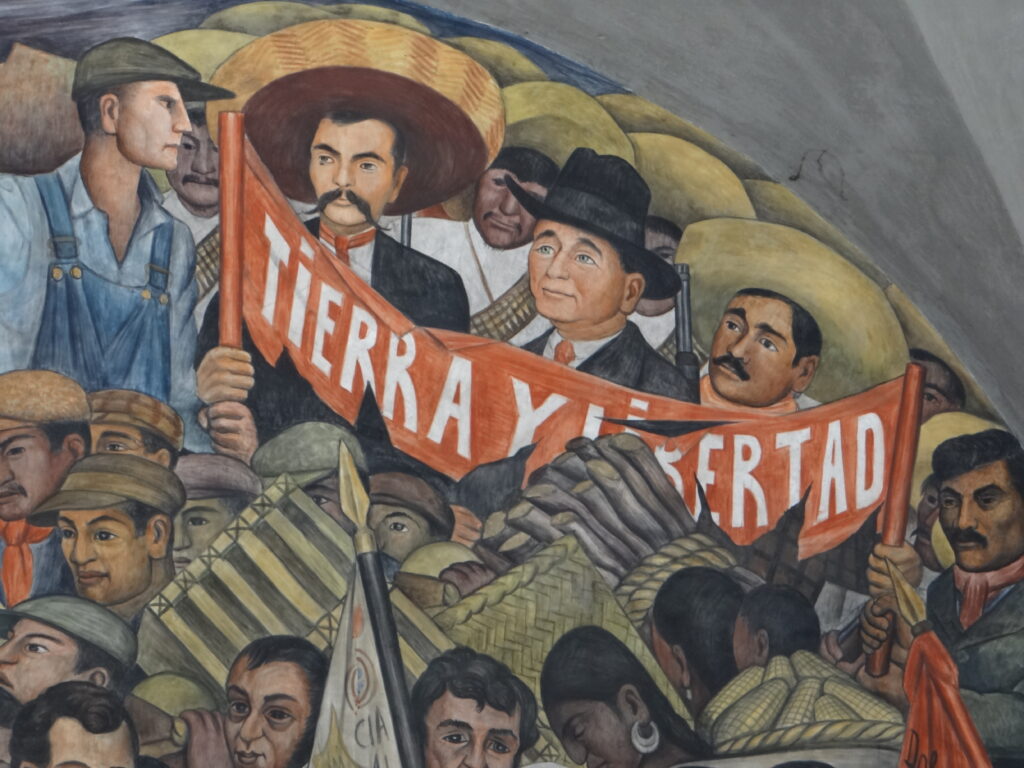
I think this will allow us a diverse response, the answers will be very different according to the places we are living in. So we will have multiple answers, and multiple forms or regaining power, that can come from assemblies or other forms. I think the party system no longer serves us for anything, they no longer represent the people, they have been totally co-opted by the capitalist logic and the logic of money, because parties, what they are looking for is money, to belong to the money dynamics.
On the issue of power, we also need to question the financial system: how do we destroy it? How do we undo this financial system on the global context? In a context where we depend so much on the logics of banks, when banks are so decisive to determine the structure of fossil fuels, how do we revert this? I think this would be and advance towards reaching power, finding answers on how to rid ourselves of this financial system, that finances fossil fuels, such a main actor in the climate emergency?
The issue of scale is super important and so we should come back to the city. I think the city is one of the elements we should be discussing. Can we keep on maintaining huge cities? I’m originally from a gigantic city, Ciudad de Mexico, and its unsustainable to keep the life of these cities, it can only happen at the expense of destruction of territories, of the destruction of rivers and woodlands. So I think a very important question is why do we want power? The Zapatistas and the movements of the South respond that our struggle is for life. That’s why we make this question.
JC: Okay, so Alejandra introduced the issue of scale, and the importance of different responses in multiple forms of power. And she also raised the example of the Zapatista movement. And I would also like to introduce a bit that the issue of scale here has two main forms. We need to make a transformation, which only works if it’s at a very, very gigantic scale–we need to think very big, at the same time that we need to draw our forces in organized at the local level. And I think obviously, the issue that you raised of organization of cities, and you’re talking about Mexico City, which is one of the biggest cities in the world. Even Marx raised the issue of the metabolic rift between city and rural areas. And I think this is quite relevant.
The question, why do we want power? I think I go back to Walter Benjamin: at this moment, we need power to be able to pull the handbrake, to stop the madness. And then we need to rebuild, which is sort of like quite the opposite of what’s happening, which is just destruction. And we actually can use our energy and our imagination, and our abilities, and our organizational societies to improve the places where we live, the life we are living together.
For this to happen we need to take power in a lot of places, not just one, to be able to stop this this crazy system.
You rose the issue of the financial system: how do you get rid of it? It’s probably the main source of geographical organization and the power structure in the world is built on the financial system–not only, obviously, the energy system as well food system, but this is like the main tool for trade.
There’s another source of power which we often take lightly: communication. There’s like ten companies that run most of the media around the world–old and new. And a bit like our conversation about the state, when some media passes a more radical message, in reality this is just a small note. It is never an antisystemic narrative because they exist with the objective of maintaining the hegemony within the system. So, the question of communication is very important as it is a tool of permanent maintenance of the capitalist system. It determines which is the subject, what is the viewpoint about the subject, the theme, and always keep it very well confined and controlled. Sometimes they can let someone a little more radical speak just to make a sort of balance, but in reality, it is one of the strongest and more subtle tools of the system. And today it is much stronger than one hundred years ago.
AJ: One of things that I think the climate justice movement got right was pushing a new narrative. Even though this was very difficult and it is always at risk of being absorbed by the dominant narrative, the narrative of the system, easily falling into green capitalism. I think we have the task of keeping eroding that hegemonical narrative, how to create cracks and present what is being built that is different, I think that’s the great challenge.
I think that it’s important that in these cracks that are opened, we can signal what’s behind, what is behind the narratives, who finances these narratives, who gives them life. The financial system, the money system, is who’s behind this. The experience that exists in different territories that are building autonomy is exactly this: a part of autonomy is being able to build community radios, communication systems and even cellular systems that allows us to exit the hegemonical logic. And that is also made invisible by the hegemonical logic, and our wager is also this: to be able to redefine with whom we can build alliances and with whom we want to start dialogues with. To be able to offer alternatives.
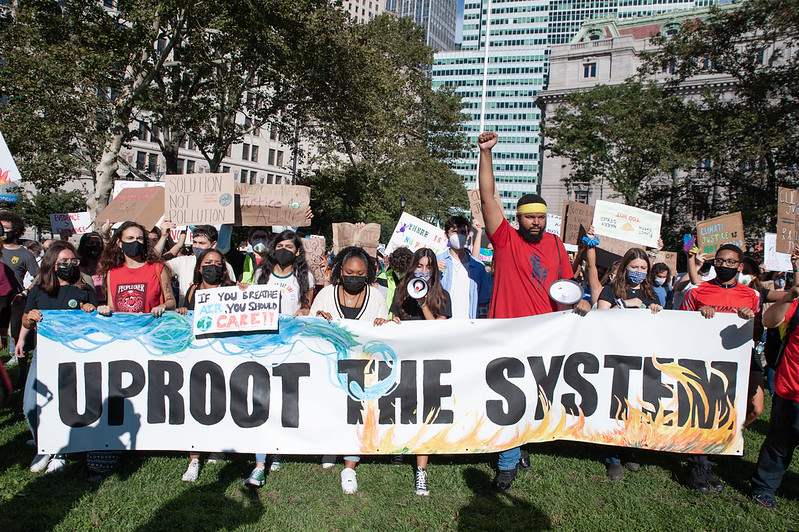
JC: We need to use these cracks, but we need to do it very fast. There have been a lot of apocalypses, regional apocalypses, many times. I think that, for the first time, it is not going to happen in egalitarian temporal scale, but this threat, for the first time, includes everyone. And it is a shame to have to use this, but it is what this system has done to us: divide us and leave us separated and alienated from each other. But if we don’t do this now, it is not credible that we will be able to live in a world in any way similar to the one in which we have live in the last millennia.
AJ: Certainly not. And certainly not exactly because this world is what provoked the current situation. And I’m not talking about millennia, but about the last centuries.
JC: Certainly the last centuries, but even in geological terms, and climatic long-scale terms, we were offered 12 thousand years of a very acceptable climatic stability. It was the time when it was possible for humanity to expand a lot, because we had existed for 300,000 years, and only with the Holocene have humans expanded throughout the world. But only with capitalism did almost everything change. A lot had changed since the 15th and the 16th century, but the speed of change since has become explosive.
AJ: Sometimes I think we are too anthropocentric. It is totally legitimate and necessary, but I think the planet will be much better without us. And here we get at the risk of going essentialist. But thinking more on a logic of nature, and how us humans are a part of this nature, we would need to adapt more to the rhythms of nature. Maybe nature’s rhythms are different from ours. Even more so in this capitalist logic. We need to act now, actions are urgent, I don’t doubt that, but we also have to trust much more in nature and listen to it more. To connect to nature. Maybe this will change our rhythm and maybe the answers are not on the speed of our actions.
JC: I have a lot of doubts about what you are saying. We are struggling to find out what the human being is. If the majority of human beings behaves and acts under a capitalist hegemony, then according to what they say, that is human nature. This obviously something absurd to say, but it is the way they present it. Because this is what they want humans to be.
This hegemonical system that enormously benefits the capitalist elites. That is destructive to a lot of people, but it alienates people so much that people feel culturally tranquilized by the system, because it is the only one that exists and there is no alternative. Actually, the dispute we are making in the next decades is about what it is to be a human. If a majority decides that we keep on going–even if that majority is alienated–if they allow us to march towards collapse, this vision wins.
What we can always say is that there is no destiny. If there is one, it can be built by us. Many times, action is completely anti-deterministic. The only reason why we act is because we don’t think there is a destiny and that the cards are marked and there is nothing to be done.
That is something very important that we need to bring to the movement, because despair is something the system produces permanently, including when you act, that what you do has no impact, or that the only way for it to cause impact is participating in the system, and that small things can be achieved.
Of course we should look into the last century, with all social movements that existed, always looking for a better world. But we are in a much worse world today in general. Without time. This also opens incredible doors. We are going to live historical times, with a lot of opportunities and possibilites of change, in which we have to act. This is also very important possibility for everyone which is alive today.
AJ: In the end, the idea of change for Humanity is a constant, so. I think that these changes are happening because change is constant. What we can’t do is be complacent. In whose hands is the possibility to communicate? Who controls the networks, the internet, the media? We need to do certain balances: how do we balance all the information we have and be consistent with what we can actually do, without falling into the fatalism that we can’t do anything, and just carry on.
JC: I think we are going to do a lot. In any situation. There’s no way it will be a calm, peaceful thing.
AJ: No, it will not. I think there will be different fronts, something which is already happening.
JC: So, Alejandra, a big hug and that you have a great day, a great afternoon there in Mexico, and a hug to everyone.
AJ: Hugs, thank you! Bye

